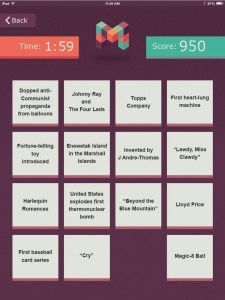“MemoryMatters©: A Mobile Aid to Stimulate Reminiscing In Persons With Memory Loss”
Symptoms of memory loss, such as those indicative of Mild Cognitive Impairment (MCI), can serve as precursors to more insidious, progressive forms of dementia, particularly Alzheimer’s disease (AD). Memory loss is a serious and unsettling problem for those who experience it as well as for caregivers and family members. Memory plays an important role in interpersonal communication. When an individual begins to experience cognitive and memory loss there may be various behavioral consequences. They may experience changes in personality, a lesser sense of self, or a loss of independence. This can lead to situations that are challenging to professional caregivers and family. Examples of these are high levels of depression, loss of self- esteem, grief, fear, and frustration, all of whih have a significant impact on the well-being of the individual and their relationships with others. Reminiscence interventions are effective in producing positive outcomes including
improvements in the ability to communicate as well as in mood, well-being, quality of life, social interaction, cognition particularly autobiographical memory) and staff knowledge of information regarding the person with memory loss. Reminiscence interventions also hold some potential to reduce caregiver strain. In this project we are developing a novel cognitive approach to enhance reminiscing activities in persons with memory loss. In addition, our approach is designed to intentionally increase professional/family caregiver communication/interaction with individuals with memory loss and decrease caregiver and family stress. The proposed Memory Matters (MM) mobile aid goes beyond typical psychosocial interventions in memory care that are built on a “look/listen/discuss” paradigm. Instead, MM engages the person with memory loss in interactive activities designed to tap their long-term memories in a novel ways using a “think/do/reflect” paradigm. MM is thus a more cognitively focused and user-engaged approach.
Press Release:
Moai Technologies LLC announces a Small Business Innovation Research award from the National Institutes of Health to build mobile game apps for Apple’s iPad to promote reminiscing
MINNEAPOLIS, MN: September 12, 2014. Moai Technologies LLC has received a ($235,904) Phase I award from the National Institutes of Health’s Small Business Innovation Research program to explore the health benefits associated with the use of mobile game apps in reminiscing and reminiscence therapy.
According to Daniel Klassen PhD, the project’s Principal Investigator, “The Memory Matters project involves building and testing interactive game apps for Apple’s iPad mobile tablet for older adults. These multimedia games are fun and help promote a ‘trip down memory lane.’” Matching and sequencing games featuring the music, radio shows, fads, toys, hobbies, cars, TV shows, movies, firsts, headline news, fashions, product ads, inventions, and other important events from the past are used to stimulate the player’s memories and reminiscing.
Joseph Gaugler PhD, the project lead researcher form the University of Minnesota’s School of Nursing, Center on Aging, states “Reminiscence interventions hold potential to stimulate persons with memory loss and improve their well-being, and due to these benefits could also reduce the strain of family and/or professional caregivers. The Memory Matters project is exciting in that we are developing a novel cognitive approach, using mobile technologies, to enhance reminiscing activities in persons with memory loss.”
Phase I of the project will end in September, 2015. If funded, the project’s Phase II will provide significantly more support to the development process.
Project Title: Memory Matters: A Mobile Aid to Stimulate Reminiscing in Persons with Memory Loss.
Research reported in this press release was supported by the National Library of Medicine of the NIH under award number 1R43LM012085-01. The content is solely the responsibility of the authors and does not necessarily represent the official views of the National Institutes of Health.
Contact: Dr. Dan Klassen, VP of Software Development, Moai Technologies LLC, Minneapolis, MN. Phone: (612) 353-4542. Email: dklassen@gmail.com www.MoaiTechnologies.com
